- Latest articles
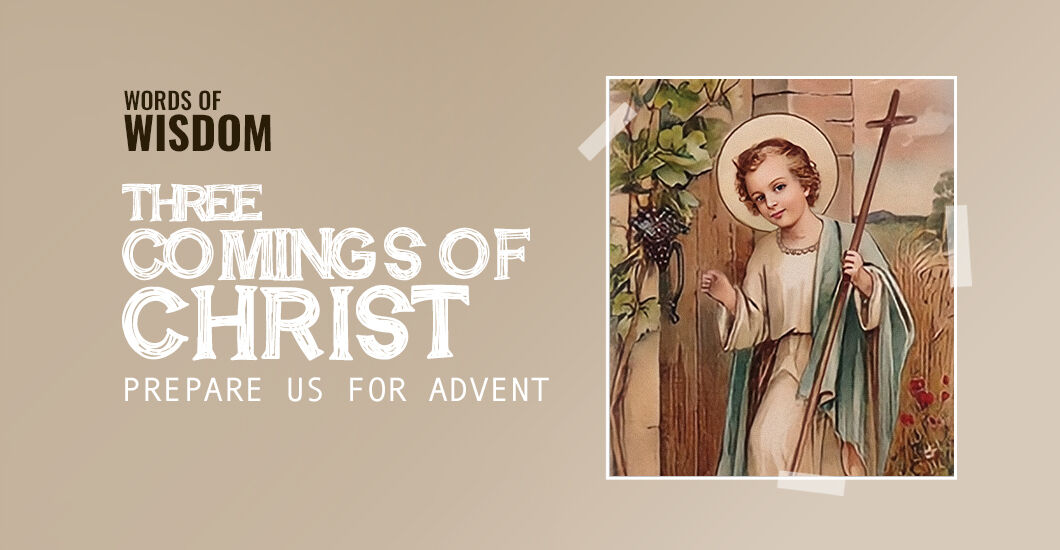
Many years ago, in the context of a high school religion class, a very wise Benedictine nun gave me a template for understanding Advent that I’ve never forgotten. It is simply that Advent calls to mind three “comings” of Christ: the first in history, the second now, and the third at the end of time. Meditating upon each of these is a helpful preparation for the holy season upon which we are embarking.
Let us first look back. Fulton Sheen said that Jesus is the only religious founder whose coming was clearly predicted. And indeed we can find throughout the Old Testament indications and anticipations of the arrival of the Messiah. How often the New Testament authors use the language of fulfillment and insist that the events around Jesus occurred “kata tas graphas” (according to the Scriptures). They appreciated Jesus, this particular figure from two thousand years ago, as the one who brought to full expression all of the institutions of Israel. His rising from the dead demonstrated that he is the New Temple, the New Covenant, the definitive prophet, the Law or Torah in person. Furthermore, they understood that Jesus had brought all of history, in a very real sense, to its climax. The turning point of the human story is not, therefore, the emergence of modernity, not the revolutions of the eighteenth century, but rather the dying and rising of Jesus, the Messiah of Israel. If we turn Jesus into a mythic or legendary figure or we construe him simply as an inspiring religious teacher, we miss this crucially important truth. Every single New Testament author witnesses to the fact that something happened in connection with Jesus, indeed something so dramatic that all of time should be understood as falling either before him or after him. And so, during Advent, we look back with deep interest and spiritual attention to that first coming.
Christ came in time, long ago, but we must attend to the second dimension of Advent—namely, his coming to us in the here and now. We might think of that famous painting of Jesus knocking at the door. This is the Christ who presents himself every day, seeking entry into our hearts and minds. In his first coming, he appeared in the context of Israel. In this present-day Adventus, he appears through the sacraments of the Church, through good preaching, through the witness of the saints, through the Eucharist especially, and through the poor who cry out to be cared for. We recall his words, “Whatsoever you do to the least of my people, you do to me.” Now just as many rejected him when he came in history long ago, so, sadly enough, many reject him today. Can we see that the most important decision we will ever make—more important than decisions regarding job, family, livelihood, etc.—is whether we allow Christ to become the Lord of our lives? During the season of Advent, we are meant to stop and pay close attention. How is Jesus coming to us and how, precisely, are we dealing with his arrival?
And finally, Advent calls to mind Christ’s definitive coming at the end of time. One of the peculiar marks of Christianity is the belief that time is going somewhere. It is not just “one damn thing after another,” as the cynical adage famously has it, nor simply an endless cycle, nor the “eternal return of the same.” Rather, time has a direction, moving toward its consummation, when God will be all in all. The Church identifies this final culmination as the “second coming” of Jesus, and the Gospels speak of it often. Here is just one example from the Gospel of Luke: “Jesus said to his disciples: ‘There will be signs in the sun, the moon, and the stars, and on earth nations will be in dismay. . . . People will die of fright in anticipation of what is coming upon the world. . . . And then they will see the Son of Man coming in a cloud with power and great glory.’” What this remarkable language conveys is the conviction that, at the close of the age, the old order will give way and God will renew the great structuring patterns of reality. At this second coming of Christ, all of the seeds that had been planted throughout nature and history will bear fruit, all of the latent potentialities of the cosmos will be actualized, and God’s justice will cover the earth as the waters cover the sea.
The Church’s belief—and it governs the whole of its life—is that we are living in the in-between times; that is to say, in between the culmination of history in the cross and Resurrection and the definitive fulfillment of history in the second coming of Jesus. In a sense, the war against sin and death has been won, and yet mop-up operations continue. The Church lives in that middle zone where the final stage of the battle is still being fought. Pay attention, especially during the Advent season, to our daily Gospels at Mass. I think you’ll be surprised how often they reference the second Advent of Jesus at the end of time. I might offer just two well-known examples: “We proclaim your Death, O Lord, and profess your Resurrection, until you come again,” and “As we await the blessed hope and the coming of our Savior, Jesus Christ.” This is the how the Church speaks during the in-between times. Though we are beset on all sides by failure, pain, sin, sickness, and the fear of death, we live in joyful hope, for we know that history is going somewhere, that God has won the decisive battle and will win the war.
Therefore, this Advent, look back; look around; and look forward. With each glance, you will see the Christ who comes.
'
Standing at the crossroads can be daunting, but help is only a prayer away…
When I was only eleven, my life was changed forever by a severe leg injury. Without reconstructive plastic surgery, I would have been permanently crippled. My admiration for my plastic surgeon fuelled my desire to follow in his footsteps so I could also help people in need. Performing reconstructive surgery in private practice and on medical missions satisfied this desire and I wasn’t keen to give it up as retirement loomed.
Long before I retired, I was already making plans to continue my missionary work and I also planned to volunteer as a hospital chaplain. Unfortunately, the Corona Pandemic threw a wrench in my plans. However, I remembered that Einstein once said, “When you stop learning, you start dying,” so I resolved not to fall into the temptation to become a couch potato.
I decided to take a spiritual guidance course. I soon realized that I had been looking for what I wanted to do, and not what God had in mind for me. Once I understood this, it didn’t take long for Him to answer my prayers for guidance and enlightenment. I received an email from the Sacramento Life Center, looking for a volunteer medical advocate and have been enjoying this work for the past year.
Volunteer medical advocates help out with a number of simple, but important tasks for patients in hospitals. Often, patients are just looking for a non-judgmental ear. Maybe they feel lost and are looking for information on referrals or other services. Sometimes they need some help getting basic baby needs such as diapers, baby wipes, formula, clothes, car seats, stroller, etc. Sometimes, they are simply searching for answers. The confusion and distress that patients experience when these needs aren’t met adds to their pain, and hinders their recovery, so these volunteers have a crucial role.
During my medical career, I had the opportunity to save and transform lives. Being an advocate can be just as rewarding. Sometimes, I meet people who are contemplating abortion. It is amazing what reviewing a little pregnancy physiology can do, especially if they think of the unborn child as a blob of tissue. When the sperm and egg unite, a new life begins. This is one of God’s greatest miracles. Only six weeks after fertilization, the patient can see and hear the unborn child’s heart beating through ultrasound. I show them life-size embryo models, as we marvel over the baby’s growth and development. “WOW, look at his eyes and ears and his little nose and mouth! His hands and feet have tiny little fingers and toes.”
Potentially, I could save three lives in one visit. Conflicted feelings after abortion can lead to suicide or broken relationships. The information and advice I provide, often leads to decisions that lead to life instead of heartbreak and guilt. When an abortion-minded couple comes into the clinic, but leaves having chosen life, I feel warm and bubbly inside. I thank God for His gifts and blessings that have allowed me to do His work.
'

Ever wondered what is the shade of a soul? Let me share what God infused into my mind while journaling…
I am a believer in Journal Writing. I believe everyone can write. If you can think and speak, you can write since writing is just talk written down. But I have been taught a new lesson recently. Pen or pencil in hand (or keyboard), as you draw down those thoughts, worries, and trivia in your mind, another Voices can be heard. Sometimes, God can speak to you through you!
I have a morning routine of reading from three daily devotionals after attending mass. I love God’s Word and I know it is living and active, so when a Scripture quote “speaks” to me, I write it down in my journal. Then I might write down my own thoughts.
On June 24, 2021, I was doing just that. I was feeling very bothered by all the divisions in our world. This group versus that group kind of thinking, and bickering seemed to be all about. I felt that mankind had so more to unite us than divide us. I picked up my pen and started to write. I wrote for about 15 minutes without stopping. I wrote in poetic form as well which is very rare for me. The writing just flowed and I let it. Then it was over and it was complete. God seemed to be confirming what I had thought about mankind’s connections. He gave me the reason for that connection. He even gave me the title — “What Color is a Soul?”
According to the Catechism of the Catholic Church, “The human soul is created directly by God and is not “produced” by the parents. (CCC 366-368, 382) Saint Hildegard of Bingen said, “The soul speaks: I am called to be the companion of angels, because I am the living breath God sent forth into dry clay.” Again, we find in the Catechism, “The soul causes the material body to be a living body.” (CCC 362-365,382)
Now, my journal writing did not include references to the Catechism of the Catholic Church, but I include them because they support what was given. But let’s go on with the entry:
God goes about picking up and mixing the earthen blend of the dry dirt. When He has just it just right, He puts in the perfect part—the God part. Does He wrench it from His own Sacred Heart? With the God part in, God bestows a Breath and perhaps a kiss. And a new creation is sent to earth. Every human being is created with a soul. No one is alive without one. No exceptions ! Doesn’t this unite every being on the planet? We know also that this soul never dies. The flesh decays, the God part lives on. It is the eternal life given by the Father.
Now our God loves variety. He didn’t just create “flowers”. He created every form, color, size, variety, function, perfume of flowers. Pick any form of creation animal, mineral, celestial, etc and you will find myriad expressions of each. God’s imagination is well, Godly. And all He creates is good. So we know the soul-bearing human is created in every color, size, shape,gift and grace. In every part of the globe, humans are connected by God’s amazing gift of our souls.. What color is a soul? It is not black, white, red, brown, yellow, etc. Our Artist in heaven gathers all shades of the universe. In His Image, He colors us majestic and grand. Each of us are meant to sparkle and shine. Don’t you think that it’s a sacred sign that we are innermost Divine. What color is a soul? It is Divine!
That journal entry calms and comforts me. It tells me that God is in control and He wants me to trust Him. My Savior knows my thoughts! The wisdom in the words was not my wisdom. I had been seeking an answer, and it was given. I feel that God wrote to me, through me, after my prayer. The Presence of God is ever with us and within us. God speaks to us through other people and the beauty of nature around us. He talks to us through our laughter, our music and even our tears. Many times we just don’t notice, but what about the times we do notice? Do we think ourselves out of that holy moment? When our thoughts are confirmed, or when our readings answer a question that has been on our minds or when we are “taught” as I was, do we tell someone about it? We need to share these encounters with our living God more often. It makes the Kingdom of God present on earth when we do. How much God loves us! Each of us is a beloved child of our good God. We don’t earn His love. We can’t lose it either. Therein lies the greatness of our merciful God.
Read Scripture. Pray. Meditate. Write. God can write to you, through you! Oh, and remember journal writing is unedited writing. Don’t stop to check spelling. Don’t wait for the perfect sentence to begin. Just write! You never know what God has to say to you.
'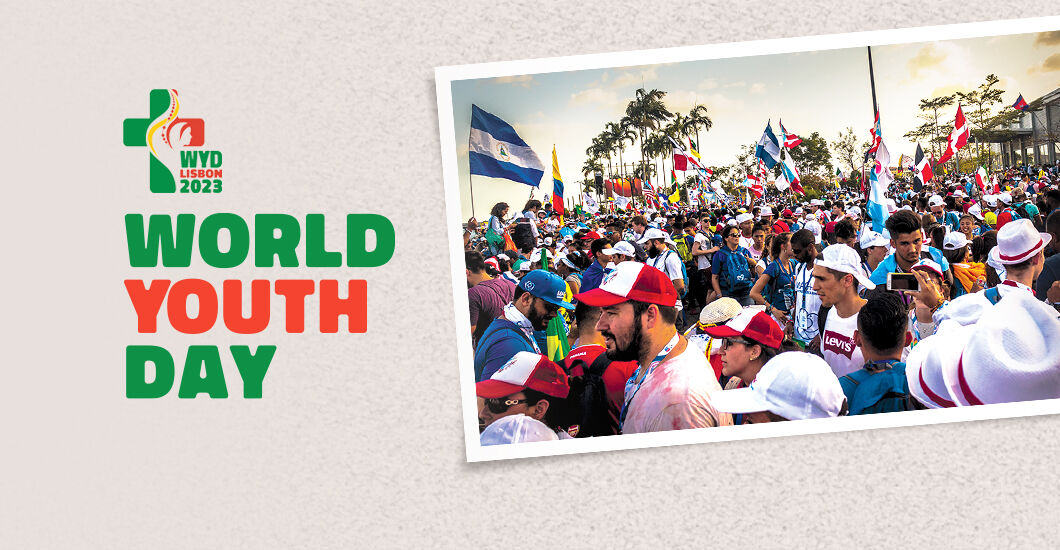
Heard about World Youth Day? Sister Jane M. Abeln prods you to take a chance and experience this unbelievable celebration that brings Heaven to earth
From the day Pope John Paul II appeared as the new Pope with the words, “Be not afraid!”, I greatly admired and followed him. He inspired my work with youth, for whom he had a special charism. In 1984 and 1985, he issued a special invitation for youth to join him in Rome on Palm Sunday. This was so successful that he expanded it into a “World Youth Day” (or rather week) which now occurs in different nations around the world every two years.
A Polish-born journalist shared a marvelous insight into how Pope JPII evolved the idea of World Youth Days. “In Communist Poland, he had to find ways of helping Catholics express their faith. Every year, he organized pilgrimages to Jasna Gora (Shrine of the Black Madonna), for August 14-15. He discovered how greatly these built relationships and strengthened faith in his people.”
Although I am no longer a youth or young adult, God in His Providence made it possible for me to attend the North American World Youth Days. World Youth Day is designed for the 16-35 age group, but priests, religious, families and older chaperones are also welcome. With less than a year to go for the August 1-7, 2023 World Youth Day in Lisbon, Portugal, I share my experiences to inspire you to join the pilgrimage, to support others to attend and to join them in prayer.
WYD 1993, Denver, Colorado, USA
With Pope John Paul II coming to Denver in 1993 for the first World Youth Day in the USA, I began planning a local event in our archdiocese to tie in with it. When it fell through, I read about a surplus “packet” offered by Salesians at a bargain price, which included the round trip flight and hotel, and arranged to go with a local youth group.
The motto of Denver World Youth Day was: “I have come to bring you life—abundant life” (John 10:10).We felt it enfolding us from the very moment we arrived to hear the airport filled with the joyful sound of young adults singing to the Lord in languages from around the globe. That continued through the catechetical days. The cheerful enthusiasm of the young people and their chaperones was like a foretaste of Heaven as they laughed, shared meals, smiles and deep conversations. Wherever they went, they sang, danced and chanted while they waved their banners and flags in the streets. Grace flowed as people flocked to receive the Sacrament of Reconciliation, pray around the clock at Eucharistic Adoration and gather for reverent, prayerful Masses. When Pope John Paul arrived, he was greeted by applause and animated voices chanting, “John Paul II, we love you.”
The culminating World Youth Day began with a pilgrimage on foot to the venue of the final Mass. Pilgrims could walk 15 miles, or take the trolley and walk just 3 miles. I chose the latter on the 90ᵒ F day, but after Vespers service with the Holy Father, the field at Denver’s mile-high site dropped to 40ᵒ. Although I nearly froze because I didn’t bring the warm clothing advised, I was entertained by the Spanish and French youth who danced all night. The dawning of a new day, returned warmth to our bodies as we emerged from our sleeping bags to prepare for the final Mass. This was so beautiful that tears of joy streamed from my eyes as I prayed in union with so many young people filled with hope for the future.
In a riveting homily to the millions gathered before him, Pope John Paul II challenged us to be active in promoting a “Culture of Life” to counter the devastation being wreaked by the “Culture of Death” which promotes contraception, abortion, euthanasia, divorce, despair and suicide. This call would inspire the formation of many new apostolates including “Crossroads” which began at the Franciscan University of Steubenville, and has expanded into annual pro-life summer pilgrimages in 3 countries, publicly witnessing to the communities they pass through, as they make prayerful sacrifice for them.
WYD 2002, Toronto, Canada
In 2002, I was blessed to be sponsored to attend Pope John Paul II’s final World Youth Day in Toronto, Canada. Although the Pope was now bent with age, and shaking with Parkinson’s disease, he still had the capacity to invigorate and inspire a new generation to carry on the mission. Although Sunday started with a downpour, I clung to a hope that it would clear. The Gospel came from Matthew 5. Just as the words, “You are the light of the world,” (Mt 5:14) rang out through the stadium, the sun broke through the clouds.
The Pope’s homily came straight from his Shepherd heart: “Jesus Christ is the Light in the world’s great darkness. Don’t get caught in the darkness. Although I have lived through much darkness…I have seen enough evidence to be unshakably convinced that no difficulty, no fear is so great that it can suffocate the hope that springs eternal in the hearts of the young.”
He directly addressed the sex-abuse scandal that had just broken out: “Don’t be discouraged by sins of darkness, even in priests and religious. BUT [he shouted] remember the many good priests and religious whose only desire is to serve and do good.” He encouraged the youth to follow religious and priestly vocations—“the royal road of the Cross” on which, in difficult times, “the pursuit of holiness becomes even more urgent.” Many vocations were born that year.
When our Holy Father announced the next site as 2005 in Cologne, Germany, he added, “Christ will meet you there.” My heart skipped a beat and tears filled my eyes, because he usually said, “I will meet you there.” I knew, we all knew, that he knew his final days were at hand.
2005 and beyond
In August 2005, I sat with my dying Dad watching on television as Pope Benedict sailed down the Rhine River to meet the world’s youth in Cologne. It amazed me to realize that the Pope who succeeded Pope John Paul II was a native of the country already chosen for the next World Youth Day! A similar thing happened in 2013. As youth from every continent, except Antarctica, prepared for World Youth Day in Rio de Janiero, Brazil, Pope Benedict resigned, and was succeeded by Pope Francis from the continent already chosen. Pope Benedict and Pope Francis both totally embraced the legacy of their predecessor and World Youth Day continues to inspire youth to follow the path of holiness.
WYD 2023, Lisbon, Portugal
Young people from all over the world are now planning to travel to Lisbon for the next World Youth Day. The host country is planning for Days in the Diocese across Portugal for youth to experience their culture, and they have an enticing program packed with talks, workshops, and events from some of the Church’s best preachers, musicians, and artists. Local families, schools and parishes are preparing to accommodate the many young pilgrims. The Sacrament of Reconciliation and Eucharistic Adoration will be everywhere and teams are already praying for the expected visitors. Pilgrimage groups are forming in nations around the world, and parishes are fundraising to assist their youth to attend. If God is calling you there, He can help you get there, and sustain you on life’s journey. It’s one of the treasures of the Catholic Church in our time. (See your diocesan website, and YouTube and Facebook for the official promo, song in 5 languages, logo, and scenes).
Those who can’t attend can participate in some events via social media, and pray in union with the pilgrims.
'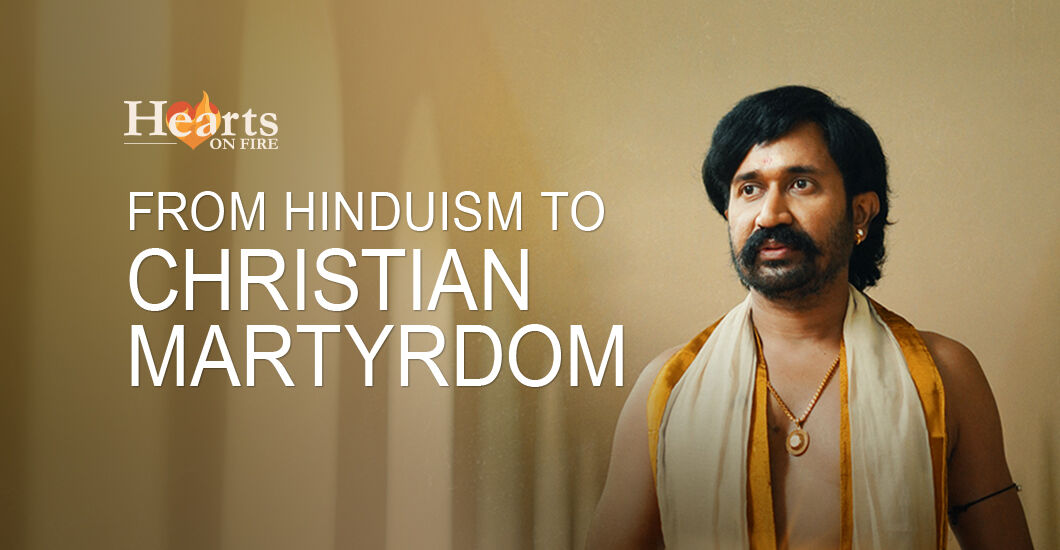
Nilakandan Pillai was born into a Hindu family in South India in 1712. His parents were devout upper caste Hindus. Nilakandan’s family was closely associated with the Royal Palace, and he served the King of Travancore as a palace official in charge of accounts.
In the Battle of Colachel, fought in 1741 between Travancore and the Dutch East India Company, the Dutch naval commander Captain Eustachius De Lannoy was defeated and captured by the King. De Lannoy and his men were later pardoned and served the Travancore army. Official work brought Nilakandan and De Lannoy together and a close friendship formed between the two.
During this period, Nilakandan faced many misfortunes, and was beset with doubts and fear. De Lannoy consoled his friend by sharing his Christian faith. The story of Job from the Bible greatly comforted Nilakandan, and their conversations drew him to Christ. Nilakandan decided to receive baptism, though he knew this decision would mean sacrificing his social status and the service of the King. On 14th May 1745, at the age of 32, Nilakandan was baptized into the Catholic Church, taking the name Devasahayam, the Tamil rendering of the biblical name Lazarus.
Devasahayam experienced immense joy in living his faith and strived to be a true disciple of Jesus. He thanked God every day for the grace of conversion and eagerly shared his Catholic faith with others. He soon persuaded his wife and several of his military colleagues to confess their faith in Christ. Devasahayam had no regard for the caste system and treated the so-called “low caste” people as equals.
Soon the palace officials who opposed his newfound faith turned against him. They conspired to have him arrested. The King asked Devasahayam to renounce his Christian faith, and promised him a prominent position in his court. But despite the allurements and threats, Devasahayam stood firm in his faith, which further enraged the King. Regarded as a criminal, Devasahayam endured inhuman tortures for the next three years. He was whipped daily, and endured having chili powder rubbed onto his wounds and into his nostrils. Given only stagnant water to drink, he was paraded around the Kingdom on a buffalo with his hands tied behind him — an infamous punishment reserved for traitors and meant to discourage future conversions. Devasahayam endured the humiliation and torture with great patience and trust in God. His gentle and kind demeanor surprised the soldiers. Every morning and night he spent time in prayer, and continued preaching the Gospel to all who came to listen.
The ministers who had conspired against Devasahayam obtained permission from the King to execute him in secret. On 14 January 1752, he was then taken to a deserted mountain to stand before a firing squad. Devasahayam’s only request was for time to pray, which the soldiers granted. As he prayed, shots rang out and he died with the names of Jesus and Mary on his lips.
Devasahayam was declared a Martyr and Blessed on December 2, 2012. In February 2020, Pope Francis recognized a miracle attributed to the intercession of Devasahayam, and on May 15th, 2022, he was canonized, becoming India’s first layperson to be declared a saint.
Shalom World has made a program based on the life of this great saint, whose courageous witness and martyrdom continues to inspire the faithful of today.
To learn more about St. Devasahayam, watch the episode of ‘Glorious Lives’: https://www.shalomworld.org/episode/indias-first-layman-martyr-saint-st-lazarus-devasahayam

Saying ‘No’ would mean plunging her family into a dark hole of financial stress, yet she took that firm step…
I am a 31-year-old Ex-Assistant Professor from India. ‘Ex’ because it has been months since I gave up that title. After graduating from college in 2011, I spent the next four years preparing for the Chartered Accountancy course, the equivalent of CPA preparation. I soon realized that pursuing CA was not my calling and dropped out.
A Dream Come True
Giving up what many would consider a lucrative career might seem foolish, but my decision led me to recognize and acknowledge my real passion, which is teaching, something I had dreamed about since childhood. After I shifted my focus to a teaching career, God blessed me with a teaching job in the Primary Section of a well-acclaimed school.
Though I taught in that school for four years, I wasn’t content because my childhood dream was to be a college Professor. By the grace of God, after nearly four years of teaching, I received the certification I needed to apply for an open position as Assistant Professor at a local college. When I was offered the job, I joyfully lived my dream and served the needs of my students for two years as an Assistant Professor.
Difficult Choice
In the middle of my third year, our college began the accreditation process that confers a ‘Quality Status’ to institutions of higher education. Though it was a lengthy, painstaking process with too heavy a workload, things went ahead smoothly in the beginning. But eventually, we were pressured to take part in unethical behavior that bothered me greatly. The administration required us to create fake records and to document academic activities that never took place.
My reaction was disgust—so strong that I wanted to leave my job. However, things were not fine at home. We are a family of four. My parents were not working, and my brother had lost his job. Being the sole earner in the family, it would be difficult to give up the job. Due to the pandemic, it would also be difficult to find another job. Despite all this, I somehow mustered the courage and submitted my resignation. But my supervisors refused to accept it, promising that I would no longer need to create false documents and that I could even work from home. Reluctantly, I accepted the terms. Within months, however, I was again asked to document an academic seminar which never took place. Each time I indulged in such malpractice, I felt like I was betraying the Lord. I shared this dilemma with my spiritual mentors who encouraged me to give up this job that did not glorify God.
Tryst with Destiny
Finally, I mustered the courage and I said ‘no’ to my supervisors. And it was a BIG no. Instead of submitting the assigned task, I submitted my resignation. I left the job immediately and refused my salary for the previous month since I was leaving without giving notice.
Financially, I had jumped into utter darkness. My family relied on my income. My mother’s recent surgery had drained the family’s savings. I barely had enough to cover the next month’s expenses. I didn’t know what to do. I didn’t tell my father and brother about quitting my job because they would never have approved.
I did the only thing I could do—I held firm to the Lord and relied on His strength. I sought the intercession of Mamma Mary by praying the Holy Rosary constantly. Days and weeks passed, and I received no calls for interviews. Fear started gripping my soul. By the end of September, I still had no interviews scheduled by any of the recruiters whom I had approached. I was desperate.
An Incredible Surprise
On September 30, I finally received a phone call from an International School located near my home inviting me to interview for a position to teach the same genre of subjects I had taught at the college. This was an incredible surprise. This School, based on Cambridge University IGCSE curriculum, requires a level of subject knowledge equivalent to that expected of undergraduate faculty at an Indian University. I was offered the position and finalized my employment in early October 2021. And God also blessed me with a higher salary than I earned at the college. Praise be to God!
Today, when people ask why I left college to teach in a high school, I share how awesome my God has been to me. Even if my new position had been a humbler job with less salary, I would still have accepted it joyfully for the sake of my Lord Jesus. As I look back, I realize that worldly titles don’t matter. What does matter is that we win the eternal crown. As the Letter to the Hebrews says, “Let us…persevere in running the race that lies before us while keeping our eyes fixed on Jesus, the leader and perfector of our faith” (12:1b-2).
I share my story with joy, not to malign my previous employer nor to brag that God blessed me because of how prayerful I have been. My purpose is to share my conviction that when
we take one step for the Lord, He will take hundred steps for us. If you ever find yourself being asked to compromise on God’s commandments but fear that saying no will bring
negative financial consequences upon you and your family, I will dare to recommend, my dear brother or sister, that you risk jumping into financial darkness for the sake of the
Lord…and trust in His mercy.
The experience of the Saints, and my own humble experience, assures me that our God never abandons us.
'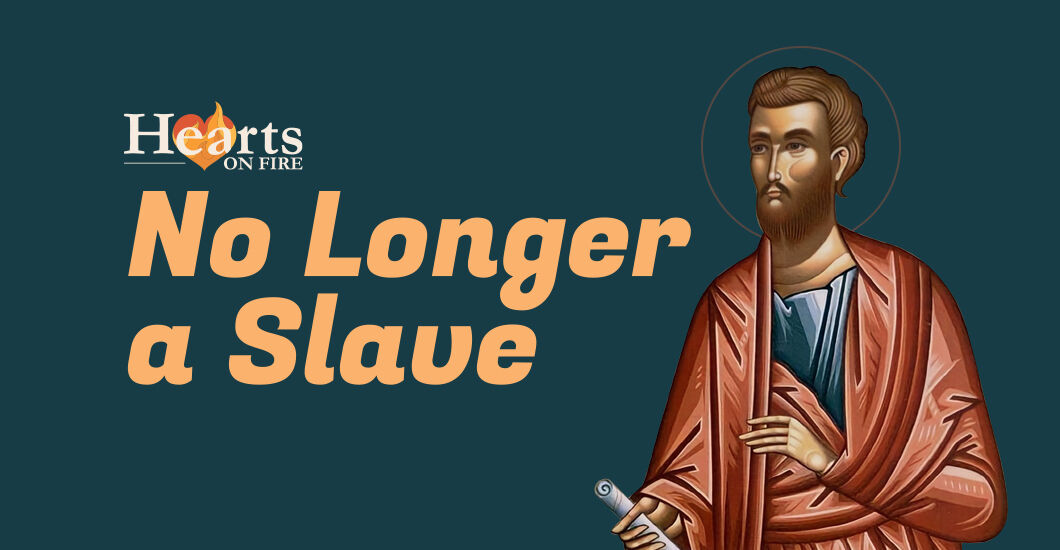
Have you heard of Onesimus about whom Saint Paul wrote the shortest “book” in the Bible?
A Phrygian by birth, Onesimus was a slave to Philemon, an influential member of the Christian community. Philemon had been instructed in the faith and baptized by Saint Paul, who has become his friend and mentor. We lack definite details, but we know that the slave Onesimus had run away from his master—perhaps taking with him some wealth that wasn’t his. At some point after his escape, Onesimus meets Saint Paul in the city where Paul is imprisoned—possibly Rome or Ephesus. Because of Paul’s preaching, young Onesimus embraces Christ and becomes a beloved and indispensable member of Paul’s entourage.
Nonetheless, despite wanting to keep him as his companion in ministry, Paul sends Onesimus back to his master Philemon. But Onesimus does not go unarmed: he carries a brief, but powerful letter Paul has penned. Still a cherished part of the New Testament, The Letter of Saint Paul to Philemon presents Paul’s entreaty that Philemon forgive Onesimus and accept him as “no longer a slave, but more than a slave, a brother and beloved…”
The Letter does not tell us how Philemon responded, but tradition suggests that he did pardon Onesimus, who then returned to his faithful service of Saint Paul in Rome. We know from Paul that later Onesimus carried Paul’s Letter to the Colossians to that community. Tradition also says that, as a zealous preacher of the Gospel, Onesimus eventually succeeded Saint Timothy as Bishop of Ephesus. But his frequent and ardent preaching inflamed with the love of God attracted the attention and the anger of the authorities.
After the martyrdom of Paul, the governor of Rome seized Onesimus and exiled him to one of the islands. There too he went about preaching and baptizing, further infuriating the governor. Onesimus was then arrested and taken in chains to Rome and subjected to cruel tortures for eighteen days. His legs and thighs were broken with bludgeons and finally he was beheaded for refusing to deny his faith in Christ. It is believed that his martyrdom occurred under Emperor Domitian in the year 90.
'
Experience the love you always dreamed of…
There are many and varied images of Jesus Christ. One that causes me sadness yet gives me great hope is the Sacred Heart. In this familiar image, Jesus is pulling back his cloak to reveal His heart which is flaming, pierced, and surrounded by a crown of thorns. If we did not know better, we could think it was a sign of defeat. Perhaps one might even think Jesus is glorifying pain and suffering.
Having been someone who has been on the other side of healthy, I identify and find solace in that agonizing image. Many times, when there was nothing in the material world that could soothe, including well intentioned humans, in the depths of my loneliness and suffering, I could always find courage at the foot of the Cross and in that wounded Heart. He knew. He was there to meet me in that place.
Jesus appeared to Saint Margaret Alacoque and said to her, “My Heart, loving passionately mankind, can no longer contain the flames of its charity; it is necessary for it to manifest it to them, in order to enrich them with the treasures it contains.”
Still Doubtful?
Christ’s heart of love is burning so profusely and generously it cannot contain itself. He desires to pour out His uncontainable, unfathomable love on humankind sharing the treasures of His Sacred Heart.
So, what are we afraid of; pure, unselfish, immeasurable love? What holds us back from this most lavish offer?
What keeps humanity at a distance? Why are we reluctant and afraid to let that love consume us? At times, I feel unworthy of that level of generous, magnanimous love. Is it free, even for the likes of me?
Love is what directs God’s Heart. God IS love! Perhaps our warped understanding and experience of love is what scares us the most? Maybe we have been used instead of loved properly. Maybe the love we have been shown in the past from someone we were close to was measured, earned, or conditional? When they had their fill or became bored, they discarded us and moved on to something or someone more interesting?
What about our family of origin? Was it broken or dysfunctional? Our first home should have been a “school of love” where we were taught many valuable life lessons on love, free to make mistakes and learn from them. Sadly though, they might have been places of betrayal, pain and abuse. You need not remain in that place of loneliness and hurt, run to the Sacred Heart.
Father Berlioux, a nineteenth-century French priest and spiritual author writes this of Christ, “It was love that caused Him to be born, to act, to suffer, and to weep; it was love, finally which made Him die. And in the Eucharist, it is love that induces Him to give Himself to us; to be our guest, our companion, and our Savior, our food and our nourishment.”
Abyss of Love
EVERYTHING Christ does and says is out of LOVE! We need not be afraid of anything He asks of us which is ultimately for our own benefit. In each of my own heavy crosses, I initially thought they were well beyond my ability to handle. On my own that is true. It is in our weakness Saint Paul says, “…for the sake of Christ, that we are strong.” (2 Corinthians 12:10) When we are under the delusion of believing we have it all together, it is there that there is no room for Christ to carry and sustain us.
If your past has shown you only twisted versions of faux love. If your current situation is not the best demonstration of a “selfless donation for the good of another,” then may I strongly recommend you to turn to the genuine Heart of Love to seek what you are lacking. It is from this Heart—the Most Sacred Heart, that you will learn how to give and receive REAL Love.
Finally, Saint Gertrude who also had the pleasure of intimate union with Jesus shares these words, “If people but knew how You love them: if You would but discover to them the infinite riches of Your heart, they would all fall at Your feet, and would love only You, O mystery of infinite charity and abyss of love…”
So the question to each human heart is this; will you continue to spend your limited days on earth accepting a counterfeit of love, wallowing in the hurts of the past, and exposing your heart anew to more abuse? Or, will you run to the “Mystery of infinite charity and the abyss of love?”
As always, our Loving God leaves that up to us and will NOT force this amazing gift of His Love on us without our permission. So what’s it going to be?
'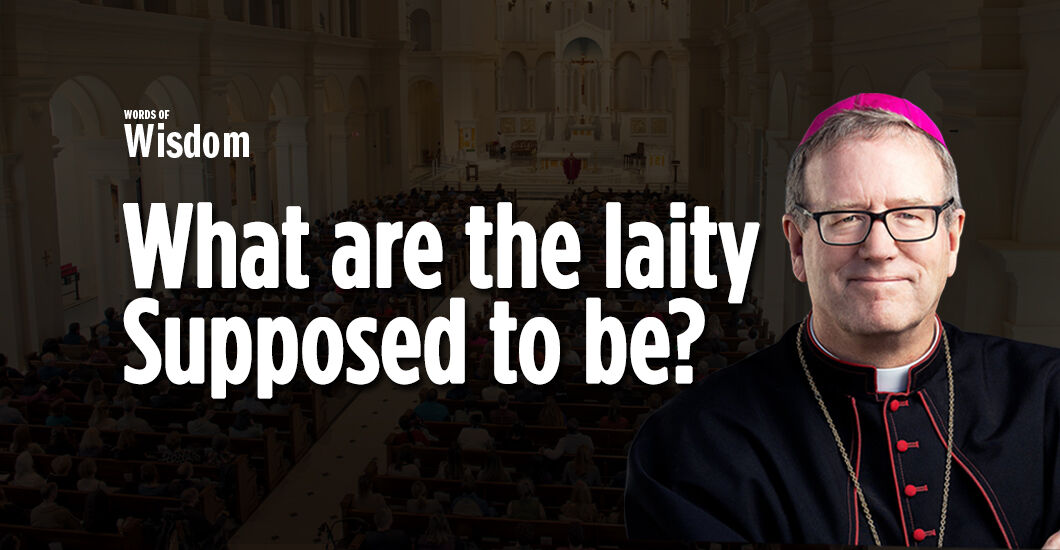
Back in the 1950s, Dorothy Day, the co-founder of the Catholic Worker Movement, began to articulate a vision that was largely ratified at the Second Vatican Council. She said that the prevailing notion of a “commandments spirituality” for the laity and a “counsels spirituality” for the clergy was dysfunctional. She was referencing the standard view of the period that the laity were called to a kind of least common denominator life of obeying the ten commandments—that is to say, avoiding the most fundamental violations of love and justice—whereas priests and religious were called to a heroic life of following the evangelical counsels of poverty, chastity, and obedience. Lay people were ordinary players, and the clergy were spiritual athletes. To all of this, Dorothy Day said a rather emphatic no. Every baptized person, she insisted, was summoned to heroic sanctity—which is to say, the practice of both the commandments and the counsels.
As I say, Vatican II, in its doctrine on the universal call to holiness, endorsed this notion. Though the Council Fathers taught that there is a substantial difference between the manner in which clergy and laity incorporate poverty, chastity, and obedience, they clearly instructed all followers of Christ to seek real sanctity by incorporating those ideals. So, what would this look like? Let us take poverty first. Though the laity are not, at least typically, summoned to the sort of radical poverty adopted by, say, a Trappist monk, they are indeed supposed to practice a real detachment from the goods of the world, precisely for the sake of their mission on behalf of the world. Unless a lay person has interior freedom from an addiction to wealth, power, pleasure, rank, honor, etc., she cannot follow the will of God as she ought. Only when the woman at the well put down her water jug, only when she stopped seeking to quench her thirst from the water of the world’s pleasures, was she able to evangelize (John 4). Similarly, only when a baptized person today liberates himself from an addiction to money, authority, or good feelings is he ready to become the saint God wants him to be. So, poverty, in the sense of detachment, is essential to the holiness of the laity.
Chastity, the second of the evangelical counsels, is also crucial to lay spirituality. To be sure, though the way that the clergy and religious practice chastity—namely, as celibates—is unique to them, the virtue itself is just as applicable to the laity. For chastity simply means sexual uprightness or a rightly ordered sexuality. And this implies bringing one’s sexual life under the aegis of love. As Thomas Aquinas taught, love is not a feeling, but rather an act of the will, more precisely, willing the good of the other. It is the ecstatic act by which we break free from the ego, whose gravitational pull wants to draw everything to itself. Like the drive to eat and to drink, sex is a passion related to life itself, which is why it is so powerful and thus so spiritually dangerous, so liable to draw everything and everybody under its control. Notice how the Church’s teaching that sex belongs within the context of marriage is meant to hold off this negative tendency. In saying that our sexuality should be subordinated to unity (the radical devotion to one’s spouse) and procreation (the equally radical devotion to one’s children), the Church is endeavoring to bring our sex lives completely under the umbrella of love. A disordered sexuality is a deeply destabilizing force within a person, which, in time, brings him off-kilter to love.
Finally, the laity are meant to practice obedience, again not in the manner of religious, but in a manner distinctive to the lay state. This is a willingness to follow, not the voice of one’s own ego, but the higher voice of God, to listen (obedire in Latin) to the promptings of the Holy Spirit. I have spoken often before of Hans Urs von Balthasar’s distinction between the ego-drama (written, produced, directed by, and starring oneself) and the theo-drama (written, produced, and directed by God). We might say that the entire point of the spiritual life is to break free of the former so as to embrace the latter. Most of us sinners, most of the time, are preoccupied with our own wealth, success, career plans, and personal pleasure. To obey God is to break out of those soul-killing preoccupations and hear the voice of the Shepherd.
Imagine what would happen if, overnight, every Catholic commenced to live in radical detachment from the goods of the world. How dramatically politics, economics, and the culture would change for the better. Imagine what it would be like if, today, every Catholic resolved to live chastely. We would make an enormous dent in the pornography business; human trafficking would be dramatically reduced; families would be significantly strengthened; abortions would appreciably decrease. And picture what it would be like if, right now, every Catholic decided to live in obedience to the voice of God. How much of the suffering caused by self-preoccupation would be diminished!
What I am describing in this article is, once again, part of the great Vatican II teaching on the universal call to holiness. Priests and bishops are meant, the Council Fathers taught, to teach and to sanctify the laity who, in turn, are to sanctify the secular order, bringing Christ into politics, finance, entertainment, business, teaching, journalism, etc. And they do so precisely by embracing the evangelical counsels of poverty, chastity, and obedience.
'
Learning to Work and Learning to Pray
When I signed up for AP Biology last year in my 10th grade, I never imagined Biology would be difficult for me. On the first day, I felt confident and self-assured. But as the days passed, I began to fall behind. While my peers answered questions and confidently recited the concepts, I felt confused and bewildered. Day after day, I smiled, nodded my head, and pretended I knew what was going on.
The night before the first Biology test I had barely studied. I looked over a few vocabulary words and attempted to memorize a few definitions. When I looked at the first test question my head began to spin. The questions were paragraphs long and despite reading them over and over again I couldn’t comprehend them!
The next day, I got my graded test back and wasn’t surprised to see 53%. But I felt dispirited because many of my classmates had received better scores. When I checked my grades online, I noticed that my overall grade was lowered to a “C.” I didn’t know what to do.
As months and tests went by, my grade kept fluctuating. My mom gave me the best advice: pray more and seek God’s help. From then on, prior to taking every test, I began to invoke the Holy Spirit and I truly felt that God was helping me. I knew I wasn’t alone. My test scores began to rise rapidly. I spent more time in prayer. Everyone noticed a radical change in me as I grew deeper in loving and trusting God.
Prior to taking the AP exam, I spent months studying, praying, and preparing for the exam. Knowing that this year’s exam would be online due to COVID-19, I was nervous. The test day arrived and the single aspiration on my lips was. “I am the God who gives you success.”
As I began the exam and looked at the data, graphs, and wordy questions, I felt discouraged and overly conscious of the time I had. However, I pushed through. I felt that I did okay. Months went by. On the day the results were posted online, my brother woke up first, signed into my account, and checked my score. He then told my mom and dad about it. I had told my family not to tell me my score until I asked them.
Hours later, unable to contain himself, I let my brother tell me my score. It was unbelievable! I couldn’t believe my ears when he said I had scored a “4” on the AP Biology exam. My classmate, who had the best grade in the class and was expected to get the highest score, got a lower score than me. How did it happen?
I know that was not through my own merit and I will always be grateful to God for this blessing in my life. Of course, I have learnt the importance of working hard and doing all the necessary study. But I’ve also learned the importance of placing my trust in God. I trust that God will always be there for me in my life to do the unbelievable, despite any obstacles I may face.
'
Get a whole new perspective through the eyes of the ultimate observer
Who is the observer? When I consider this question in prayer, I realise that I observe God’s love and mercy from a very interior and personal point of view when He allows me to witness His good works by acting through me. God’s witness is never clearer than in my role as a nurse. I see people every day when they are at their lowest and most vulnerable. In those moments, God whispers, can I come forward? When I surrender and give Him my yes, His Spirit moves through me to touch the people I care for: I feel my gaze soften to rest on the face of my patient, and I know that He is looking through my eyes. Suddenly, the right words are on my lips and I know that they come from Him.
The response from my patients is unmistakable. Their faces change and there is a peace and light about them. In those moments, I believe that I become the ultimate observer of God’s supernatural love and mercy in my patients encounter with Him. These interactions with my patients have nothing to do with me, and everything to do with God carrying out His Will through me. This can only happen when I step back from myself and allow my personal relationship with God to deepen. But it doesn’t end there. He then calls me to share that relationship with others.
Where It All Began…
When I was baptised at Pentecost last year my personal relationship as an adopted member of God’s family began. My response to God’s call was immediate and absolute. From that day forward, I became irrevocably devoted to Him. This devotion led me to understand that I can do nothing without the presence of Christ and my need for Him in my life surpassed any other need that I had. He met me where I was, totally exhausted and needing His help, and in all my imperfection and nothingness, I surrendered everything to Him. I purposefully gave Him absolute control over my life, including my marriage, friends, family, pets, career, finances…You name it, He now owns it!
My personal prayer to Him throughout the day became not my will, but Yours Lord as I began to shed layers of my old self. As a result, God transformed me inside and out. I experienced healing from my longstanding C-PTSD and various pain related ailments. People started responding to me in positive ways. Teachers crossed my path when I needed them, my already happy marriage improved beyond imagination, negative influences gently fell away without conflict, and I felt at peace. More importantly, I felt God’s presence by my side, and I began listening for His voice.
It has always been more natural for me to listen than speak to Our Lord and each day I sacrifice my time to contemplate the Face of Jesus and simply let His words flow over and within me. I believe that God Our Father desperately wants to have a personal relationship with each of us and He wants to share His burdens with us. He reveals this when we devote our time to Jesus.
Part of devoting time to Jesus is surrendering our will to Him and letting Him work through us to deliver people from their afflictions. It has been said to me that associating with sinners is against their religious values, however I wonder how we expect Jesus to continue healing the afflicted if we do not make ourselves available for Him to work through us?
Changed Forever
We don’t need to be nurses to let God touch others around us. We all have friends, family, co-workers, and acquaintances that need God’s healing love. Each time we surrender to God, we are saying not my will but Yours, Lord and our spirit connects with His. This is how God meets us. We were created to live in intimacy with God, to pray without ceasing, to live in a place of worship. As we move into this way of living, we become introspective. We receive the deep unconditional love of God, and we are forever changed. We can’t go back because we are transformed as His love for us shifts from superficial head knowledge to a deep heart revelation that becomes the very core of our identity.
At the heart of relentless love, is a lifestyle of prayer, worship, justice, and discipleship. All of this starts with surrender and dying to self: in other words, we are being crucified with Christ. Becoming the observer of God’s awesome power is firmly grounded in love. It takes place when we surrender and release the love of God, bringing restoration to people and circumstances. We love, because He loved us first, and as we release the love of God, justice flows.
We release God’s love and become His witnesses when we feed people who are hungry, when we share our faith with people, when we prophesy, when we release the supernatural power of God to bring healing, when we live with mercy, humility, and obedience. Becoming God’s observer expresses His love to the world by allowing Him to work through us, and then people encounter Him.
'